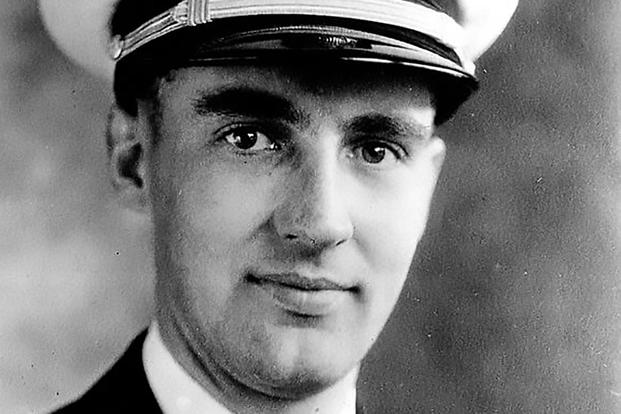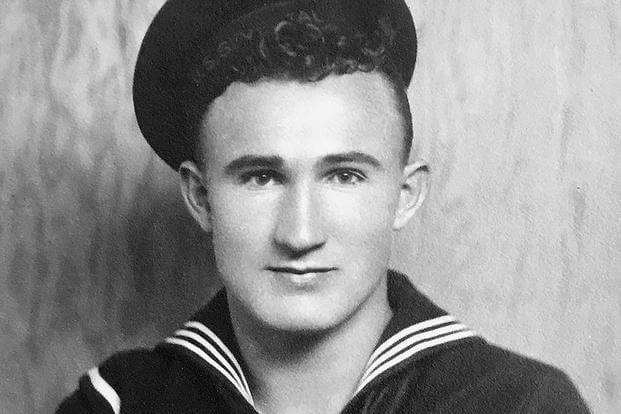Nearly fourscore years have passed since the Dec. 7, 1941, Japanese attack on Pearl Harbor, Hawaii, that catapulted the United States into World War II.
But a new examination of the fight and the sailors who defended the harbor with their lives has revealed two unsung heroes deserving of prestigious valor awards.
Aloysius H. Schmitt, a Navy chaplain who served as a lieutenant junior grade during the battle, and Joseph L. George, a chief boatswain's mate who was then a petty officer second class, will be posthumously honored on Thursday, the 76th anniversary of the Pearl Harbor attack, according to a Navy announcement.
Schmitt, who died working to help other sailors reach safety when the Nevada-class battleship Oklahoma capsized and sank, will be honored with the Silver Star medal, the third-highest combat valor award.
George, who saved the lives of sailors aboard the Pennsylvania-class battleship Arizona, will be honored with the Bronze Star medal with combat valor device. George survived the battle and would go on to retire from the Navy in 1955. He died in 1996 at the age of 81.
Recognizing Heroism
That the Navy came to present medals to these men in 2017 illustrates the gradual, and often imperfect, process of recognizing military heroism. According to Navy officials, the bravery of both men and their merit of recognition was brought to the service's attention by their surviving families.
In October 1942, Schmitt received the Navy and Marine Corps Medal, the Navy's highest award for non-combat heroism. But while Schmitt was a chaplain and not actually fighting, a clearer definition of combat made clear that he was indeed part of the battle.
His family lobbied the Navy to ensure that he was properly recognized for his heroism, according to the Navy release.
Accounts of his actions made clear just how fitting that recognition was.
Schmitt had been hearing confessions when four torpedoes struck the Oklahoma on the port side, according to Navy historical documents used for training.
Amid the chaos as the ship tilted toward its injured side, Schmitt made his way to an open porthole and began helping sailors escape. When it came his turn to make his way out, he struggled to get through the opening. Rather than block the escape route as sailors waited behind him, he chose to sacrifice himself.
"Realizing that the water was rising rapidly and that even this one exit would soon be closed, Schmitt insisted on being pushed back to help others who could get through more easily, urging them on with a blessing," according to the account.
Schmitt was one of 400 sailors aboard the Oklahoma who died when it sank, according to officials.
Schmitt's great-nephew, Dr. Steve Sloan, said in a statement that the chaplain's story is the stuff of family legend and his presentation with the medal has deep significance for his relatives.
"We would talk about what happened, how many sailors he helped escape, and what went on -- we would kind of relive it every holiday and it became a bit of a tradition. So we're very excited about the medal," he said. "I think for the older people in the family, it's a form of closure but, for the rest of us, our hope is that this is just the beginning of the story; that with the return of his remains and the presentation of the medal, his story will become known to a whole new generation."
George, the chief boatswain's mate, received a commendation for his bravery in the battle, but was never recommended by his commanding officer for a valor award.
His family, too, fought to see him properly recognized. Lauren Bruner and Don Stratton, whose lives were saved thanks to George, also petitioned for him to be honored.
George's story might not be fully known if not for an interview he gave to the University of North Texas on Aug. 5, 1978. In the interview, he described relaxing and reading a Sunday newspaper aboard the repair ship USS Vestal when General Quarters sounded, indicating an imminent crisis.
As the Arizona was hit with Japanese torpedoes, George sprang into action, putting out fires and preparing guns aboard the Vestal so that the crew could return fire on the Japanese. He ultimately threw a line from the Vestal to the Arizona, enabling sailors aboard the sinking ship to escape.
George's daughter, Joe Ann Taylor, who will receive the medal on his behalf, said in a statement that her dad began talking about the war only after his retirement from the Navy.
"It was kind of surreal. You grow up with your dad thinking of him as dad; you're not used to thinking of him as a hero," she said. "But it's a wonderful story, and I'm quite proud of him. Plus I've gotten to know the men he saved and have developed a real bond with the Stratton and Bruner families."
George's Bronze Star will be presented in a ceremony at the USS Arizona Memorial in Pearl Harbor by Rear Adm. Matthew J. Carter, deputy commander of the U.S. Pacific Fleet.
Schmitt's Silver Star will be presented by Navy Chief of Chaplains Rear Adm. Margaret Kibben in a ceremony on the campus of Loras College in Dubuque, Iowa, following a Catholic mass at a chapel where his remains are buried.
Legacy Lives On
While it took decades for Schmitt's combat valor award to be approved, his legacy has lived on in the Navy in other ways. He was the namesake for the Buckley-class destroyer escort Schmitt, in service for the Navy from 1943 to 1949.
Navy Secretary Richard Spencer called the presentation of the medals "not only appropriate, but simply the right thing to do.
"One of my highest priorities is to honor the service and sacrifice of our sailors, Marines, civilians, and family members," he said. "And it is clear that Lt. Schmitt and Chief George are heroes whose service and sacrifice will stand as an example for current and future service members."
-- Hope Hodge Seck can be reached at hope.seck@military.com. Follow her on Twitter at @HopeSeck.















